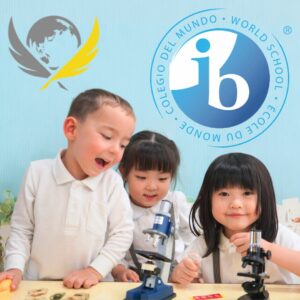Learning Begins with Wonder—and Play
学びのはじまりは「ふしぎ!」と「遊び」から
If you walk into a PYP kindergarten classroom, you might hear laughter, see blocks being built into towers, or find a child pretending to run a grocery store.
PYPの幼稚園に入ると、笑い声が聞こえたり、積み木でタワーを作ったり、お店やさんごっこをしている子どもがいたりします。
It may look like “just play,” but what’s happening is something much deeper: inquiry-based learning through play.
一見「ただの遊び」のように見えても、実はとても深い「探究の学び」が起こっているのです。
At the heart of the IB Primary Years Programme (PYP) is the belief that young children learn best by exploring, questioning, imagining, and discovering the world around them.
IBの初等教育プログラム(PYP)は、「子どもたちは、探し、問い、想像し、発見することで学ぶ」という考え方が土台になっています。
And in the early years, play is the most powerful way to do that.
幼児期では、「遊び」がその学びの一番の方法なのです。
What Is Play-Based Learning?
遊びを通した学びとは?
Play-based learning means that children are actively engaged in meaningful experiences that connect to what they’re curious about.
「遊びを通した学び」とは、子どもたちが自分の興味や好奇心に基づいて、意味のある体験をすることです。
It’s not just free time—it’s purposeful, guided, and rich with opportunities for growth.
ただの自由時間ではなく、目的を持ち、先生のサポートがあり、成長のチャンスがたくさん詰まっています。
たとえば:
- Building a train track might become a discussion on direction, distance, and cooperation
電車のレールをつなげながら、「どっちの方向?」「どのくらい長い?」と話し合う - Pretend play at a restaurant encourages math, communication, and empathy
レストランごっこで、注文を取る(数学)、やりとりをする(言語)、お客さんを思いやる(共感) - Drawing cherry blossoms in spring connects to seasons, culture, and expression
春に桜を描くことで、季節・日本文化・表現が結びつく
How Play Supports Inquiry
遊びが探究につながるとき
In the PYP, we use Units of Inquiry—broad themes like “How We Express Ourselves” or “How the World Works.”
PYPでは、「探究の単元」という広いテーマにそって学びます。たとえば、「私たちはどう表現する?」「世界はどう成り立っている?」など。
Within each unit, children are encouraged to:
その中で子どもたちは:
- Ask questions(質問する)
- Experiment with materials(素材を使って試す)
- Make connections(経験をつなげる)
- Share their ideas creatively(アイデアを絵や工作、ストーリーで表す)
遊びの中で、これらの探究は自然に始まり、深まっていきます。
More Than Academics
学力だけじゃない、大切なスキル
Through play, children also develop social and emotional skills, like:
遊びの中では、社会性や感情のコントロールといった「生きる力」も育ちます:
- Taking turns and sharing(順番を守る・分け合う)
- Managing frustration(くやしさと向き合う)
- Negotiating with peers(友だちと話し合う)
- Expressing emotions in healthy ways(気持ちをうまく伝える)
These “soft skills” are also part of the IB Learner Profile, including being:
これらは、IB学習者像にもつながる大切な姿勢です:
- Caring(思いやりがある)
- Principled(信念がある)
- Reflective(ふり返る力がある)
…and more!
Play in the Japanese Context
日本文化とPYPの遊び
In Japan, values like group collaboration, nature appreciation, and seasonal awareness are deeply rooted.
日本では、「みんなで協力する」「自然を大切にする」「季節を感じる」ことがとても大切にされています。
Our PYP kindergarten honors and includes these traditions in playful ways:
PYPの幼稚園でも、それを大切にしながら、遊びに取り入れています。
たとえば:
- Outdoor mud kitchens with seasonal plants(自然の素材を使った外遊び)
- Group games that build a sense of community(みんなで協力する集団遊び)
- Origami linked to cultural events like Tanabata(季節の行事と結びついた折り紙制作)
These moments blend local traditions with global thinking.
地域の文化を大切にしながら、世界の視野も広げていきます。
Final Thought
最後に
Play isn’t separate from learning—it is learning.
「遊び」と「学び」は別のものではありません。遊びこそが、最高の学びなのです。
It’s how our youngest PYP learners begin to explore their place in the world, understand others, and take confident first steps toward becoming inquirers for life.
子どもたちは、遊びを通して世界と出会い、人を理解し、「一生探究し続ける人」への第一歩を踏み出します。
So next time your child says,
「きょう、ようちえんであそんだよ!」
you can smile and know:
“They were learning something powerful.”
「今日もすばらしい学びをしていたんだな」と、安心してくださいね。


